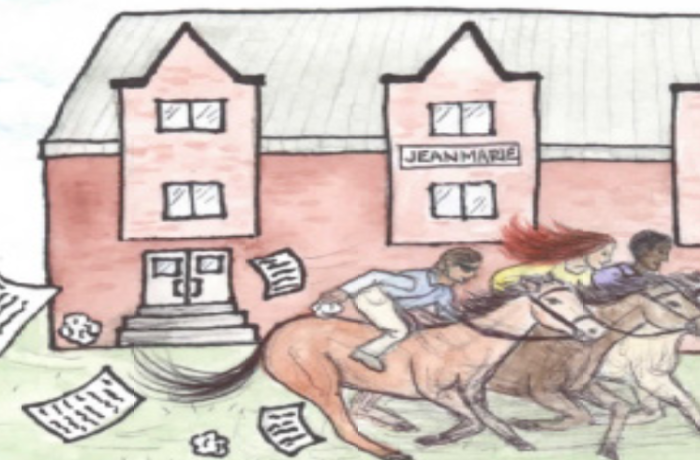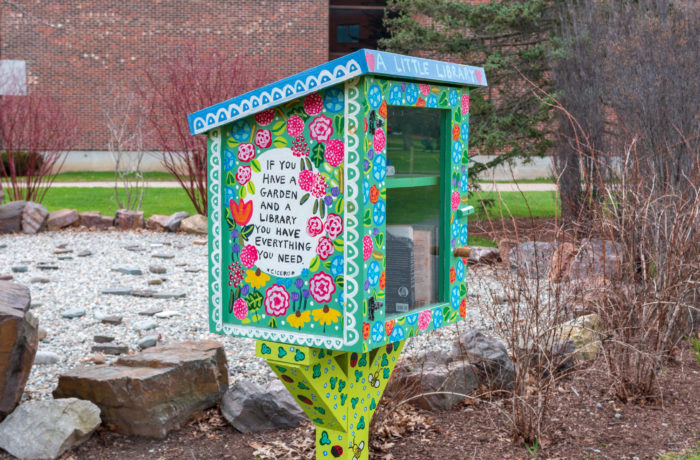As she always does in the spring, Ingrid Peterson, director of career development at St. Michael’s College, finds herself making sure she is updated on seniors’ plans for life after college. Ironically, cardboard boxes also fill her office space in anticipation for the next chapter of career development’s future.
In a three-tiered initiative, Peterson and the staff of the Office of Career Development will move across the street to Pomerleau Hall to merge with Alumni Relations and focus on life after college, which will aim to draw alumni back to St. Michael’s to interact with current students much more closely than ever before.
“Our goal is that when students first come here, they start having conversations about what it means to have a career, what it means to pick a profession,” said Angela Irvine, chair of the strategic planning committee and Director of Foundation Relations.
Life After College will work closely with academic departments on campus to find alumni in a specific field of study who desire to become mentors for current students, in essence creating ‘career communities.’ Peterson said she will be partnered with a staff worker in the alumni office, and their focus will be on students who are interested in alumni who are in business, finance, accounting, and entrepreneurship. Other partnerships between the Life After College office and the academic departments will focus on other student pursuits.
Director of Alumni Relations Angela Armour ’99 said she has long sensed that a merger between Alumni Relations and Career Development would be helpful to students. She said that the events put on by her staff, including the academic symposium, have turned into more network-based receptions, where students meet up with alumni for networking, expanding their professional network, and looking for leads on jobs.
“This is how alumni want to give back to the college …. giving their time, giving their talent, giving their expertise, and advice,” Armour said.
Student mentorship
Life After College will also foster student-to-student interaction. Juniors and seniors will have the opportunity to guide first-year and sophomore students with the decision-making of picking majors and what they want to pursue in their lives. Once those juniors and seniors graduate, they will continue to have the opportunity to work with their mentees, Peterson said.
“If those students can create internships with these alumni or business partners in the community that’s going to make them that much more marketable when they leave here,” Peterson said.
Certification
Life After College will also be offering certificate-based programs in areas that are not normally taught in the St. Michael’s curriculum, such as project management. Alumni may serve as the faculty or as the mentors for students’ experiences and projects.
Irvine said she has focused on three areas of critical skills for life after college. The first area looks at competencies for college to career, the second focuses on internships and jobs that allow students to apply classroom learning in a real world experience. The third area looks at the soft skills gap, collaboration and teamwork sills, and adaptability.
“Regardless of what your major is or what career path you decide to take, you will leave here knowing that you have your content (material you learn in traditional classroom-based settings), but you have these other skills as well, which set you apart,” Irvine said.
Real work on campus
A second strategic initiative researched and developed by the strategic planning committee is for students to gain real work experience on campus, with a 10-hour per week work experience, Irvine said.
Currently, there are roughly 550 student-workers through the work-study program, but the strategic planning team’s hope is for more students to have the opportunity to work on campus. The President’s Cabinet is currently looking at budgets and total number of students, Irvine said. As 26 staff workers will be departing the college by the end of the 2017-18 school year with voluntary separation packages, Irvine said she believes that some students may be able to pick up tasks that are not going to be filled with full-time replacement workers.
A part of the work placement will require students to do activities that help to identify their interests and personality types and how those might fit into various careers, including the Myers Briggs inventory program and Where To Start If You Don’t Know Where To Start program, Irvine said.
Irvine said that the marketing and communication office wants to develop a business featuring student-run projects and content-management.
“I’m really excited because you have to do these things in real jobs,” Irvine said. “It introduces students early to career services and alumni relations.”
Co-op experiences
The third strategic initiative created is for students to be able to have a full-time, paid job during a semester, according to Irvine.
The college will be looking to develop co-op experiences similar to Northeastern University although not requiring students to study for a fifth academic year, Irvine said. St. Michael’s students will be given some credit for their co-op experience and will likely have to take a few courses either during the summer or online in order to graduate on time.
Irvine said that a lot of the academic departments already have experience-related requirements to graduate, but the college is looking to expand the options to being available for all of the departments.


